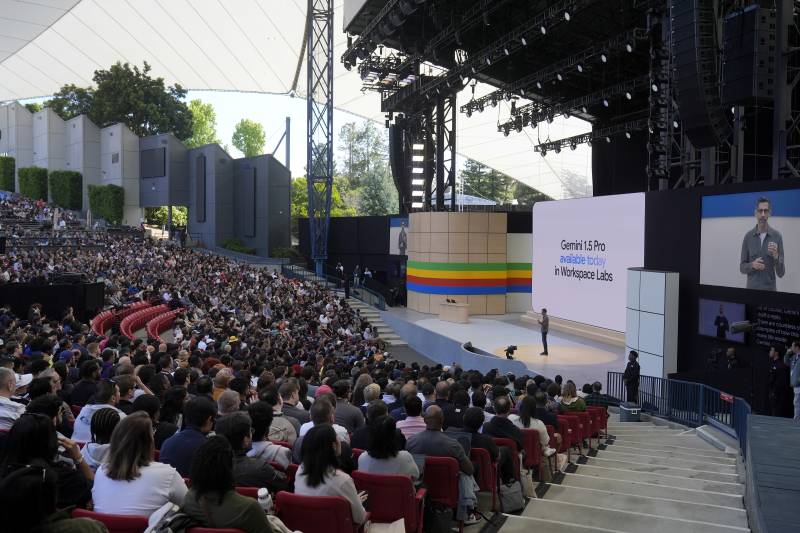The next AI steps included more sophisticated analysis powered by Gemini — a technology unveiled five months ago — and smarter assistants, or “agents,” including a still-nascent version dubbed “Astra” that will be able to understand, explain and remember things it is shown through a smartphone’s camera lens. Google underscored its commitment to AI by bringing in Demis Hassabis, the executive who oversees the technology, to appear on stage at its marquee conference for the first time.
The injection of more AI into Google’s search engine marks one of the most dramatic changes the company has made in its foundation since its inception in the late 1990s. It’s a move that opens the door for more growth and innovation but also threatens to trigger a sea change in web surfing habits.
“This bold and responsible approach is fundamental to delivering on our mission and making AI more helpful for everyone,” Google CEO Sundar Pichai told a group of reporters.
It also will bring new risks to an internet ecosystem that depends heavily on digital advertising as its financial lifeblood.
Google stands to suffer if the AI overviews undercut ads tied to its search engine — a business that reeled in $175 billion in revenue last year alone. And website publishers — ranging from major media outlets to entrepreneurs and startups that focus on more narrow subjects — will be hurt if the AI overviews are so informative that they result in fewer clicks on the website links that will still appear lower on the results page.
Based on habits that emerged during the past year’s testing phase of Google’s AI overviews, about 25% of the traffic could be negatively affected by the de-emphasis on website links, said Marc McCollum, chief innovation officer at Raptive, which helps about 5,000 website publishers make money from their content.
A decline in traffic of that magnitude could translate into billions of dollars in lost ad revenue, a devastating blow that would be delivered by a form of AI technology that culls information plucked from many of the websites that stand to lose revenue.
“The relationship between Google and publishers has been pretty symbiotic, but enter AI, and what has essentially happened is the Big Tech companies have taken this creative content and used it to train their AI models,” McCollum said. “We are now seeing that being used for their own commercial purposes in what is effectively a transfer of wealth from small, independent businesses to Big Tech.”
But Google found that the AI overviews resulted in people conducting even more searches during the technology’s testing “because they suddenly can ask questions that were too hard before,” Liz Reid, who oversees the company’s search operations, told The Associated Press during an interview. She declined to provide any specific numbers about link-clicking volume during the tests of AI overviews.
“In reality, people do want to click to the web, even when they have an AI overview,” Reid said. “They start with the AI overview, and then they want to dig in deeper. We will continue to innovate on the AI overview and also on how do we send the most useful traffic to the web.”
The increasing use of AI technology to summarize information in chatbots such as Google’s Gemini and OpenAI’s ChatGPT during the past 18 months has already raised legal questions about whether the companies behind the services are illegally pulling from copyrighted material to advance their services. It’s an allegation at the heart of a high-profile lawsuit that The New York Times filed late last year against OpenAI and its biggest backer, Microsoft.
Google’s AI overviews could also provoke lawsuits, especially if they siphon away traffic and ad sales from websites that believe the company is unfairly profiting from their content. But it’s a risk that the company had to take as the technology advances and is used in rival services such as ChatGPT and upstart search engines such as Perplexity, said Jim Yu, executive chairman of BrightEdge, which helps websites rank higher in Google’s search results.
